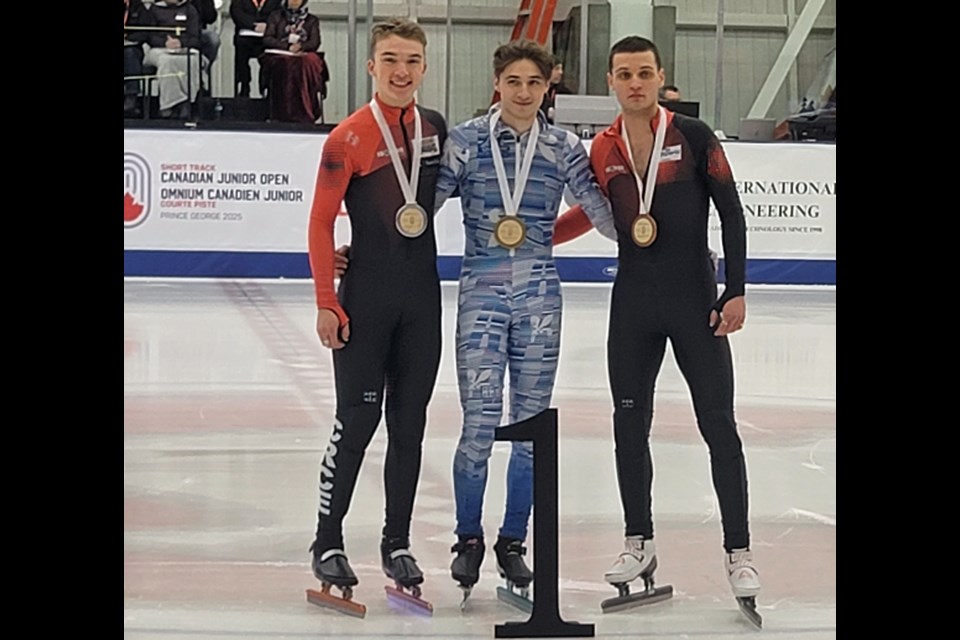Good thing the skaters at the Canadian Junior Open short tracks speed skating championships were wearing transponders around their ankles linked to a computerized timing system.
It took all the guesswork out of determining the order of finish in Sunday’s women’s 1,000-metre final at Kin 1.
Calla Haaheim knew she won the race but her margin of victory was just one-tenth of a second and it was even closer in the race for silver, ultimately won by Lea Boucher of Quebec over third-place Abbighael Jeune of Quebec.
Haaheim completed the Prince George trifecta, winning all three individual events in her return to her native province at the Junior Open.
The 17-year-old Kelowna native, who trains in Calgary with the Olympic Oval program won a cat-and-mouse game in the battle for gold in the 1,000. Somehow she avoided contact in extremely close quarters while making her moves on Jeune, the early leader, and Boucher, who gave up the lead on the final lap.
“At the beginning I just wanted to save my speed and rest and not use too much energy,” said Haaheim. “With six (laps) to go I noticed it was picking up so I tried moving up a couple places, just not leading. I think I was in second (on the final turn) and I got around Lea but Abbighael was coming on the outside and I knew she would have a lot of speed.
“She was in front of me and I was trying to set up a pass around her and I didn’t think I’d have time for an outside pass. It was a pretty tight pass, she’s good at defending, and luckily I got around her without bumping her or anything. It was a pretty tight finish and I made sure to shoot the line so I didn’t mess it up.”
Haaheim posted a winning time of 1:41.383, Boucher finished in 1:41.483 and Jeune was in at 1:41.556.
Boucher was as surprised as anybody watching that final dash for the medals that nobody was nudged out of position or penalized.
“Anything can happen in the final, everyone gives their all and everything they have left - and sometimes I watch the races and I’m scared and can’t believe I do this, but when you do it, it feels different,” said the 18-year-old Boucher, who won silver in the 500 silver and 1500 bronze.
“It’s so stressful but afterwards you feel great.”
Two lead changes in the final corner dropped Jeune from first to third but the 16-year-old Jeune was satisfied with her race.
“Short track speed skating is very difficult and you have to make sure to do the right pass and the right blocks and sometimes a half-turn can change everything, like this race,” said Jeune.
“Calla is a great skater, she’s really impressive. Next race I’m going to have to improve everything. I wanted to finish off with a gold medal because I already have bronze and silver but it’s OK, next time I’ll do better.”
It was all-Quebec final in the men’s 1000m and Justin Bessette solidified his first-place cumulative standing with another gold medal to add to his Junior Open collection after winning gold in the 500m and silver in the 1,500m on Saturday.
Knowing he’d already locked up a top-three spot in the cumulative standings needed to qualify for the Canada Cup final in Calgary in March, Bessette’s strategy to play it cool in the early going of the 1,000m final then turn on the jets to create some distance between himself and the rest of the pack for the last three laps worked to a tee.
“It was a big race because two boys (had a chance to finish in the top-three so I decided to go first and control the race to get out of the traffic,” said Bessette.
“I didn’t want to battle with them and lose energy so I decided to go in front and give everything I have left. It was a good weekend for me, I finished in the top-three and I also will be doing the Canada Cup in Sherbrooke. This was the main goal to come here and build confidence for it in two weeks.”
Charles Fortin of Montreal, the 1,500m winner who saw his first-place finish in the 500m final scuttled by disqualification for an illegal block, knew he had to kick in the afterburner to stay close to Bessette and hold off Emile Fortin of Quebec and he did that.
“I’m super happy,” said Fortin. “I still had the willpower to go through that (disqualification) and do this. I knew I could do this because I know I’m stronger and I was really confident that it would turn out well.”
Besette clocked 1:35.501, followed by Fortin (1:35.655) and Fortin (1:35.793).



.png;w=120;h=108;mode=crop)